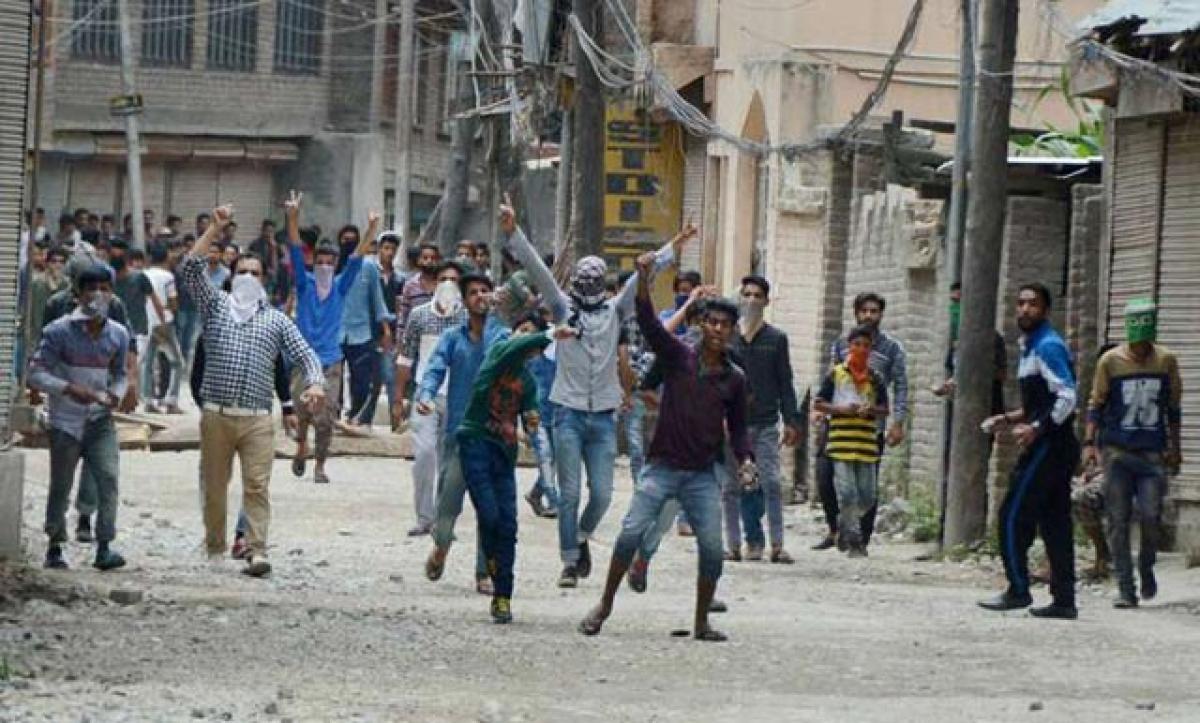Live
- Over 7,600 Syrians return from Turkiye in five days after Assad's downfall: minister
- Delhi BJP leaders stay overnight in 1,194 slum clusters
- Keerthy Suresh and Anthony Thattil Tie the Knot in a Christian Ceremony
- AAP, BJP making false promises to slum dwellers for votes: Delhi Congress
- 'Vere Level Office' Review: A Refreshing Take on Corporate Life with Humor and Heart
- Libya's oil company declares force majeure at key refinery following clashes
- Illegal Rohingyas: BJP seeks Assembly session to implement NRC in Delhi
- Philippines orders full evacuation amid possible volcanic re-eruption
- Government Prioritizes Welfare of the Poor, says Dola Sri Bala Veeranjaneyaswamy
- Two Russian oil tankers with 29 on board damaged due to bad weather
Just In

India will go on hunting militants in Kashmir despite widespread protests over the killing of a young separatist commander, officials said, as the government bets that force coupled with development will quell rebellion in the restive state.
Srinagar : India will go on hunting militants in Kashmir despite widespread protests over the killing of a young separatist commander, officials said, as the government bets that force coupled with development will quell rebellion in the restive state.
The strategy for the Muslim-majority region contested by nuclear-armed neighbours India and Pakistan has worked in part. The number of militants crossing into Jammu and Kashmir state from Pakistan to launch attacks against India has dropped in the last few years, and home-grown fighters are estimated to number only around 100, according to one security official.
Last year, Prime Minister Narendra Modi, whose ruling Bharatiya Janata Party (BJP) is closely aligned to the Hindu nationalist right, also pledged 800 billion rupees ($11.9 billion) in investment there.
That has not prevented violent protests and rioting from breaking out when security forces killed Burhan Wani, a separatist militant commander and a Kashmiri, last Friday. At least 34 people were killed almost all shot by Indian security forces and more than 1,500 people wounded in the worst violence in Kashmir since 2010, underlining how the crackdown on militants is not enough to solve a conundrum that has frustrated India since independence in 1947.
The government must also find a way to persuade local people that it is on their side, observers said, something it has failed to do since winning a landslide election in 2014. "There is no denial in Delhi ... that a problem exists," said retired Lieutenant General Syed Ata Hasnain, an Indian army corps commander in the area from 2010 to 2012 who was deployed there seven times during his career. "But no one seems to be clear on how to get into engagement with the people on the ground."
Under Modi, whose BJP is also in a coalition government in Kashmir, the federal government has taken a harder stance on engaging in political dialogue with the All Parties Hurriyat Conference, a separatist alliance. While Hurriyat leaders travelling to Delhi and meeting Pakistani officials had been accepted before, Modi's government has objected to such interactions, saying Pakistan should not interfere in Indian affairs.
"WHY THIS HATRED?"
Mirwaiz Umar Farooq, the head of the alliance, said separatist political leaders felt isolated. "The government of India cannot continue to deal with Kashmir with a clampdown," he said. The state's deputy chief minister, Nirmal Singh of the BJP, said the government was ready to engage with the Hurriyat under a legal framework. "They are not ready, but they try to exploit every situation," Singh said.
A senior BJP mandarin in New Delhi also said the government was open to talking to the Hurriyat, but did not appreciate it when they spoke with Pakistan. He added that the government will continue to go after militants, but with time it hoped the people in Kashmir would "realize that their anger is misdirected."
"Be it jobs, education, health or any other amenities, the Kashmiri population gets all the same opportunities and benefits as any other Indian," said the BJP official. "Why this hatred against the Indian government?" A senior government official in New Delhi said Wani was a criminal facing 14 separate cases, including the murder of elected politicians and security forces, and that popular support for him was beside the point.
By Fayaz Bukhari

© 2024 Hyderabad Media House Limited/The Hans India. All rights reserved. Powered by hocalwire.com







